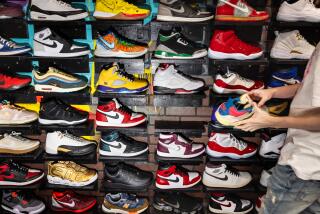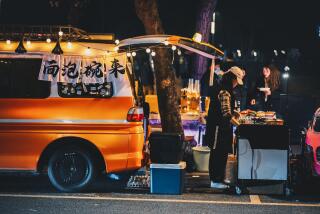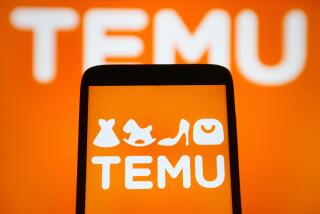Vendors’ Prospects Getting Snipped at China Silk Market
- Share via
BEIJING — The brassiere lady has seen better days.
When times were good, she had a prime spot to peddle her wares at the Xiushui Dongjie, the open-air apparel stalls known to foreigners as Silk Market. From Los Angeles to London, throngs of tourists come in search of cheap knockoffs -- from Rolex watches to Louis Vuitton handbags -- enjoying a bit of black market capitalism in the heart of old Beijing.
The bra lady’s stall is near the busy U.S. Embassy, a sales vantage point once tantamount to Manhattan’s Times Square. Business was so brisk she had a hard time keeping her faux Maidenform and Gucci bras in stock. Then the bottom fell out.
In a security move after the Sept. 11 attacks, the Chinese government closed two major entrances to Silk Market near the American compound. Now the bra lady languishes at the end of a long cul-de-sac, so removed from the main entrance that even the most diligent shoppers rarely reach her.
Since the security move, business for her and others nearby has plummeted 70% and some of the market’s 400 stalls have closed. Resentment is growing as traders say China is safe and the area around the embassy should reopen.
The traders are being hit with another whammy: The government has moved more aggressively in recent weeks to confiscate pirated goods, which violate international copyright laws. A government study concluded that China was “drowning in counterfeits.” On the mainland, about $25 billion worth of pirated goods are sold each year, or about 15% of all purchases, officials estimate.
The bra lady knows her days providing lift and support may be numbered. “I have so few customers,” she said, “the inspectors don’t need to come here anyway.”
What’s worse, the aging site poses serious safety concerns. A recent government report put Silk Market, full of narrow warrens and bottlenecks, on the list of Beijing’s top 10 fire hazards.
“If it caught fire,” the report warns, “the result would be unimaginable.”
The speculation about Silk Market’s demise increased last week when a story in the government-run China Daily newspaper quoted officials who said they had decided to demolish the stalls, which bring in an annual profit of $12.5 million. No date for demolition has been set.
Officials are contemplating moving the market from its outdoor venue to a building under construction next door. The idea worries stall owners, most of them Beijing businesspeople who use their residency status to secure street market permits, then lease them to the migrant workers who staff the stalls.
The building owners may rent directly to the migrants, closing out the middlemen, known as qilude, or donkey riders, said one Beijing official. The hawkers are reluctant to discuss the issue, fearing possible reprisal from their qilude bosses.
“The owners are really anxious,” a recent city government report notes. “They’re afraid that once the new market is done, their own interests cannot be satisfied.”
British tourist Nick White says he wants Silk Market to stay just the way it is. He loves the street theater that comes with haggling and the way the aggressive garment hawkers parrot English come-ons (“Don’t even think about walking past me!”) as they reach out to literally pull shoppers toward their stalls.
Standing in a narrow passageway, jostled by fellow shoppers in the humid June heat, White pulled up his sleeve to display four counterfeit Rolex watches.
“I just bought all my gifts for the blokes back home and paid next to nothing,” the London resident said. “Just 12 quid. Eighteen bucks. I know these things will probably stop working in a year and I’ll have to come back for new ones.
“I just hope there’s a market to come to. It’d be a shame if they closed it down.”
Silk Market traces its roots to the end of the 1966-76 Cultural Revolution, when residents were first permitted to engage in simple trade with arriving foreigners.
By the mid-1980s, the surrounding Chouyang District was thriving, with about 30 foreign embassies. The market evolved into a mecca of cheap counterfeit Western goods, as well as genuine cashmere sweaters and scarves from Inner Mongolia. By 1988, traders were monthly making twice China’s annual per capita income, about $180 in today’s money.
Silk Market soon became a required stop for tourists. The government encouraged its growth, viewing it as a cultural exchange point.
“Xiushui was more than just a mere exchange of goods,” said Li Guang Biao, a city official who oversees the stalls. “There was also a trade of cultures. Chinese foreign-language students went there to practice their pronunciation with strangers.”
But over the years, as the quality of the knockoffs improved, international manufacturers expressed concern. According to the city report, Silk Market products today are “fake but not bad quality. This hurts the real brands.”
In many cases, Chinese factories authorized by brand-name manufacturers make copies using leftover materials. The products -- identical to the original -- are sold on the black market at places like the stalls, the report says.
Officials recently closed down Silk Market for three days as agents searched for bootleg Nike, Adidas and Polo goods, as well as pirated DVDs of first-run Hollywood movies, which go for $1 apiece. Investigators have recently confiscated 1,100 items and levied $10,000 in fines at the market.
“As long as there are foreigners looking for cheap knockoffs, there will always be places” like Silk Market, said Chris Bailey, a senior consultant with Rouse & Co., an intellectual-property-rights consulting firm. “Brand-name manufacturers want to see places like this raided every so often to send a message to traders and keep them worried about ripping off your brand.”
But the Chinese government points to contradictions in Western attitudes toward pirated goods, noting that even “presidents and prime ministers have come to shop” at Silk Market.
For Wade Cornelius, Silk Market is all about the art of the deal.
The Seattle businessman, who travels to China in search of aviation parts from local factories, loves to haggle over prices even more than he likes to buy.
“I assume the price they start with is ridiculously high, so I like to come back with a price so low they faint,” he said. “And then we’re off to the races.”
On a recent day, Cornelius trudged through the area lugging a bag of shirts when a young saleswoman sidled up to him.
“You’ve bought so many big things, so difficult to carry,” she said in a hoarse whisper. Then she produced an orange scarf and rubbed it lightly across his cheek. “Why don’t you buy one of my scarves? Women love them. And they’re not heavy.”
Cornelius haggled her down from about $85 to $25, then walked away with a smile. “A most charming young lady,” he said, “but I don’t need a scarf today.”
Shoppers say they know that with such rock-bottom prices, the products can’t be real.
“I buy everything here -- handbags, dresses, perfume -- I don’t care if they’re real or not,” said an Italian businesswoman who gave only her first name, Paola. “But I don’t buy shoes. Any Italian can tell you that you can’t fake a good pair of shoes.”
As Beijing decides Silk Market’s fate, officials are trying to make the market a safer place. They have banned electrical devices and installed 500 new fire extinguishers, along with 24-hour monitoring equipment.
The antipiracy raids will continue as well -- a touchy subject with the bra lady.
Asked if the multicolored Gucci bras on her wall were real, her response was curt: “Let’s not talk about it.”
More to Read
Sign up for Essential California
The most important California stories and recommendations in your inbox every morning.
You may occasionally receive promotional content from the Los Angeles Times.














